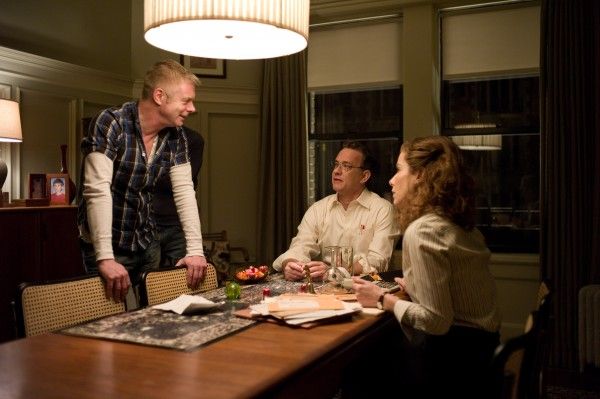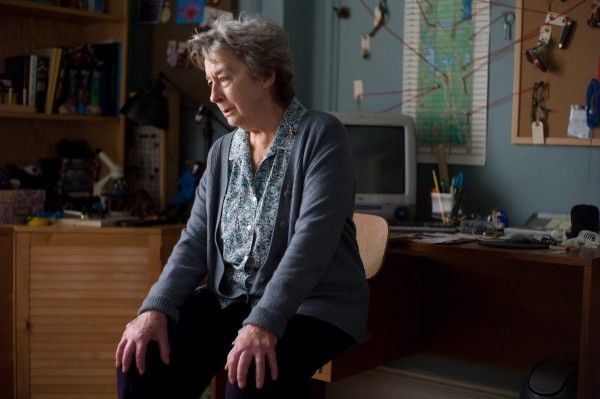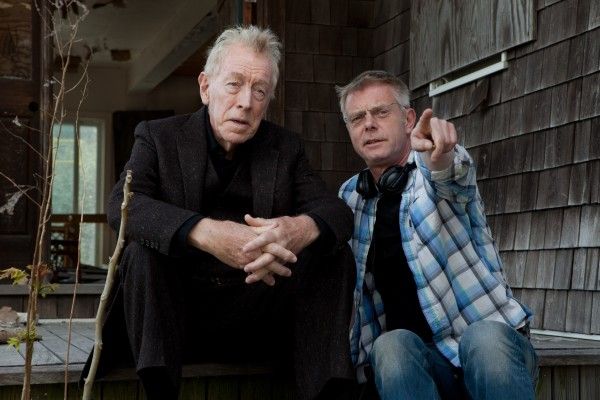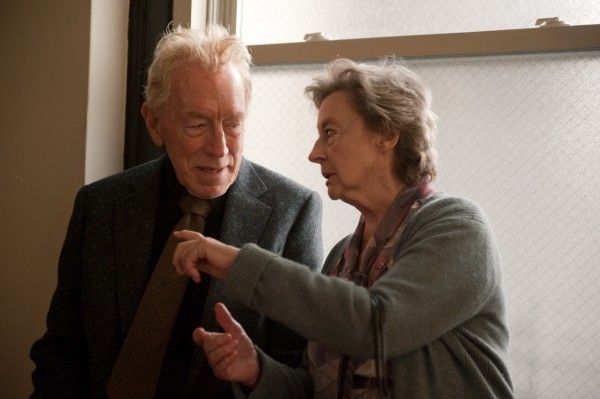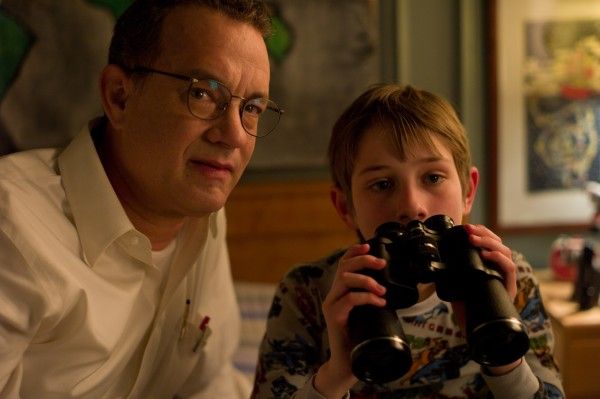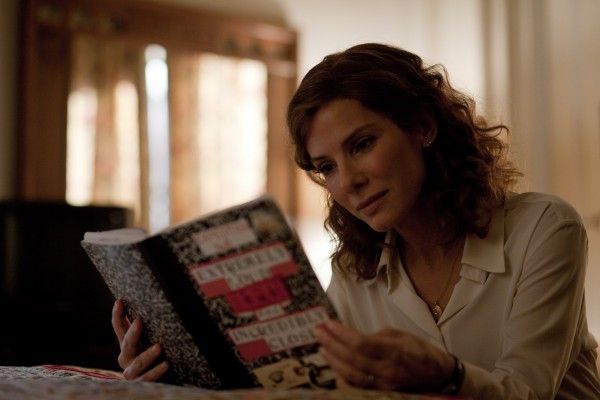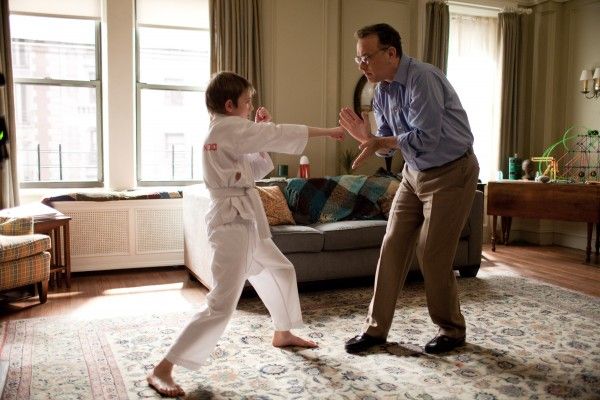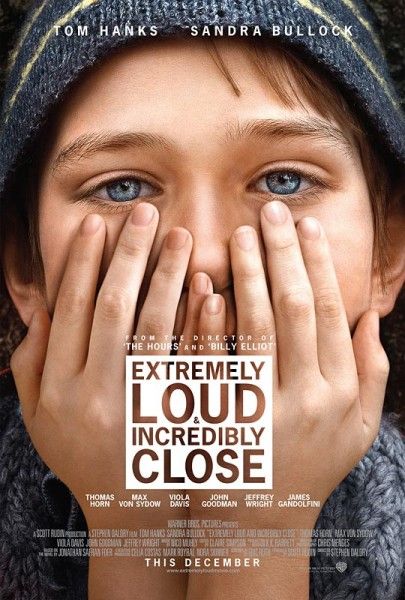Movies like Extremely Loud and Incredibly Close are difficult to review. On the one hand, part of me wants to rip Stephen Daldry’s film to shreds and call it a manipulative, corny, over-the-top, Oscar-seeking mess. But the other part of me wants to drop the cynicism and enjoy the heartfelt emotional journey for what it aspires to be: a film that attempts to cope with the aftershocks of 9/11, and mourn those we lost in the fire.
Watching Extremely Loud on Blu-ray over the weekend, I was surprised by how much I enjoyed it. While not exactly the masterpiece it thinks it is, Daldry’s film at least sidesteps the problems I had with the director’s previous efforts, especially the overtly saccharine The Reader and the morbid, depressing The Hours – both of which tried to do too much and therefore lacked focus. Hit the jump for my review.
The consensus for Extremely Loud lingered in the mixed-to-negative zone upon its release. As such I skipped out on the film during its very brief theatrical run despite the presence of stars Tom Hanks, Sandra Bullock and Viola Davis. The film went on to receive two Academy Award nominations for Best Supporting Actor (Max von Sydow) and, oddly enough, Best Picture of the Year (for which it received a lot of flak, particularly since most felt that other films, namely Drive and Shame, delivered a more satisfying product).
In effect, while all of Daldry’s films carry enough emotional heft and weepy sentiment to make even Sophie’s Choice feel like a happy-go-lucky walk in the park by comparison, none seem particularly necessary. Did we really need another film about the Holocaust? And do we really need another film about 9/11? The answer to those questions will undoubtedly determine whether or not you’ll like Extremely Loud and Incredibly Close.
Daldry’s film follows a young man named Oskar Schell (played with earnest gusto by newcomer Thomas Horn) and his attempts to unravel the story surrounding a mysterious key left behind by his recently deceased father, Thomas (played by Hanks in what felt like a cameo appearance). Thomas was in the second World Trade Center tower when it fell on 9/11, a day that understandably destroyed Oskar’s mother (Bullock, crying a lot); and ripped his own soul in two.
Oskar sets out to discover the key’s meaning, thinking it to be another game devised by his eccentric father, and ends up meeting an assortment of people ranging from the bizarre (the old man living across the way) to the beautiful (the large family who showers Oskar with love upon his arrival).
Will Oskar understand his father’s death? Will he cope with his own demons? Will he and his mother eventually bond? Will he solve the key-riddle? And more importantly, will he ever truly understand 9/11?
Such questions paint Daldry into a very dense corner. There’s no way to sidestep blatant sentimentality in this story, and screenwriter Eric Roth (Forrest Gump), working from a novel written by Jonathan Safran Foer, doesn’t hesitate to wallow in the painful details - at one point Oskar reveals a photo of a man leaping from one of the towers and proclaims, “I think it’s my dad.” Yeah.
The emotional beats don’t stop there: we watch as Bullock’s character speaks to her husband for the last time and hear the fear in his voice as the towers eventually give way; we endure endless recorded messages left by Thomas for his son over an answering machine just moments before his death – the recorder’s platonic voice serves as a doomsday clock, counting down Thomas’ remaining minutes. We watch Oskar cry when he loses control; we watch Oskar’s mother cry when he tells her he loves her … on and on … an endless assortment of emotional climaxes, all of which grow cumbersome after a while.
I was reminded of Mimi Leder’s film Pay It Forward, starring Kevin Spacey, Helen Hunt, and Haley Joel Osment. I remember walking out of that film with the feeling that I’d just been cracked over the head with a large metallic bat labeled “emotional wallop.” Such films act as gambles – they either work (see Terms of Endearment), or they fall flat (don’t see The Other Sister).
Daldry’s film doesn’t stoop to such levels (SPOILER: I think the kid died in Pay It Forward), but at times he pushes too far and loses his grip on reality. Eventually you don’t feel for Oskar anymore because his situation is so dire and pathetic it lacks credibility – kind of like Edward Zwick’s Legends of the Fall, where everything falls into shit so thick you end up laughing more than caring. Life can be bad, I know, but good Lord is it ever THAT bad?
What Extremely Loud does accomplish it does so in a big way. September 11 will never be forgotten; and Hollywood has tried to capitalize on the event through numerous films over the years – the best of which was Paul Greengrass’ United 93 – but try as they have, none fully understand the cataclysmic event and either use it to display pretentious idealism (Oliver Stone’s World Trade Center), or faux sentiment (Remember Me, Reign Over Me, and Dear John). Extremely Loud finds a chord on which to stake its point about 9/11 and then allows viewers to take with it what they may.
I liked the performances from Hanks and Bullock, and it’s a testament to their greatness as actors that we care for them despite their absurdly brief screen time. Horn has the difficult task of portraying a child knee deep in desperation, frantic and confused; frustrated and angry. There is mention of Oskar carrying some sort of disease, and it’s made clear early on that the character fears almost everything, but sometimes I wasn’t sure if I liked the kid. He is understandably upset, but also quite annoying at times. (My dad put it best: “He’s an already troubled kid thrown into a horrible situation.”)
Max von Sydow lends a delicate, wordless performance offering a nice counterpart to Horn’s over-the-top yelling and screaming. While the first act of Extremely Loud drags, the relationship between these two odd personages gives the film a much needed boost.
Daldry may force his manipulative hand one time too many, but only because he feels he actually has something important to say: that 9/11 can never be understood. Just like life where people come and go; people live and die; people love and hate; people fear and act courageously. There’s no explanation, that’s just how it is.
I can see why many were turned off by Daldry’s film. For one thing, many have yet to extinguish the hot fury of 9/11 from their minds and probably don’t need Hollywood reminding them of such a traumatic event. This wasn’t like Pearl Harbor (or even Titanic) where viewers never got to see the footage and so curiously migrated to cinemas to sneak a peek at their cinematic recreations. On September 11, 2011 the cameras were rolling. Every explosion and death was shown live from multiple angles for our viewing pleasure. That’s not easy to forget, and likely something most people never want to see again.
Warner Bros. presents Extremely Loud and Incredibly Close on Blu-ray in stunning 1080p. As expected, the film looks sharp and Chris Menges’ washed out photography at times resembles a live portrait. Typically I tend to overlook the sound in films like these, but the sound design plays a pivotal role in the film. As such, my 5.1 speaker system received a nice workout, especially during sequences involving the chaotic streets of New York. As typical, Alexandre Desplat delivers a moving score to accompany the images without ever feeling burdensome, and the HD audio presents his music sufficiently.
The special features feel more like filler than anything born out of necessity: a brief vignette showcases Daldry and his crew searching for the “Perfect Oskar” and utilizes b-roll footage to show Horn’s performance behind the scenes; “Making Extremely Loud and Incredibly Close” is the usual Q&A session during which the actors talk about what they hope the film accomplishes; “Ten Years Later” looks back on 9/11 with some interviews and archival footage, but never feels overtly exploitative; while “Max von Sydow: Dialogues with the Renter” looks at Sydow’s Oscar-nominated performance through the actor’s son’s eyes.


